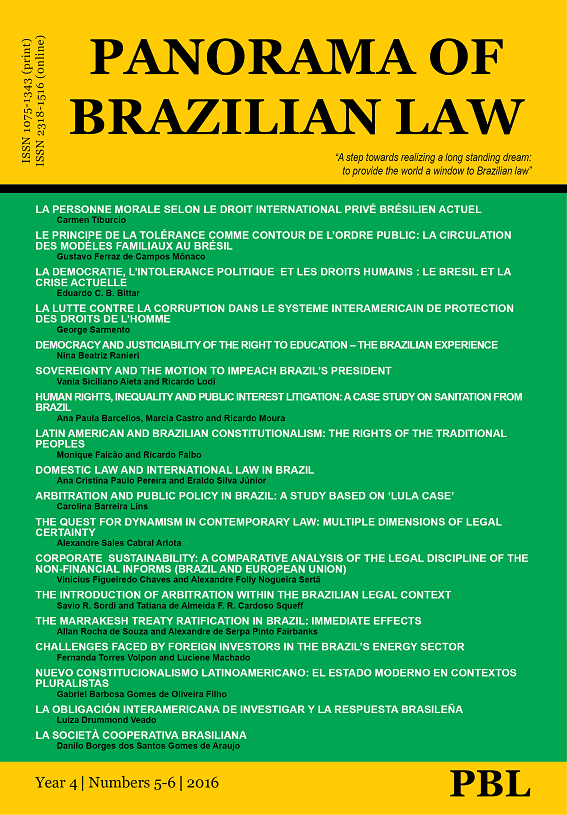SOVEREIGNTY AND THE MOTION TO IMPEACH BRAZIL’S PRESIDENT
DOI:
https://doi.org/10.17768/pbl.y4.n5-6.p110-148Resumen
This article aims to demonstrate that public policies involving the economy follow, in their process of formulation, implementation and especially results, different paths than those for the exercise of political power.This involves a question of decisions. The decisions of public officials and even of judges are not aseptic, but instead ideological.Economic crises and political disaffections over these choices cannot serve as justifications for removing that leader, elected by popular vote, especially when the “rules of the political game”, have all been respected.When democracy is threatened by such incidents, motivated by an economic downturn, notably in supposed exceptions that in reality flaunt the constitutional and legal order, we are faced with a serious injury to sovereignty in the internal plane, perhaps even a coup d’état.This article will analyze the question of the motion to impeach Brazil’s president, demonstrating there is no legal support because she has not committed any act of malfeasance in office. And we conclude that in name of seeking more successful economic results, to serve political demands that are most of the time instigated by ideological passions, a society cannot ride roughshod over fundamental rights assured by the Constitution.Descargas
Publicado
2017-05-31
Cómo citar
Aieta, V. S., & Lodi, R. (2017). SOVEREIGNTY AND THE MOTION TO IMPEACH BRAZIL’S PRESIDENT. PANORAMA OF BRAZILIAN LAW, 4(5-6), 110–148. https://doi.org/10.17768/pbl.y4.n5-6.p110-148
Número
Sección
Articles
Licencia
Panorama of Brazilian Law employs Open Journal Access policies.
Authors are fully and exclusively responsible for their submissions.
Authors who publish with this journal agree to the following terms:
- Authors retain copyright and grant the journal right of first publication with the work simultaneously licensed under a Creative Commons Attribution-NonCommercial-ShareAlike 4.0 International License that allows others to share the work on a non-comercial basis with an acknowledgement of the work's authorship and initial publication in this journal and indicating if any changes were made. If you remix, transform, or build upon the material, you must distribute your contributions under the same license as the original.
- Authors are able to enter into separate, additional contractual arrangements for the non-exclusive distribution of the journal's published version of the work (e.g., post it to an institutional repository or publish it in a book), with an acknowledgement of its initial publication in this journal.

